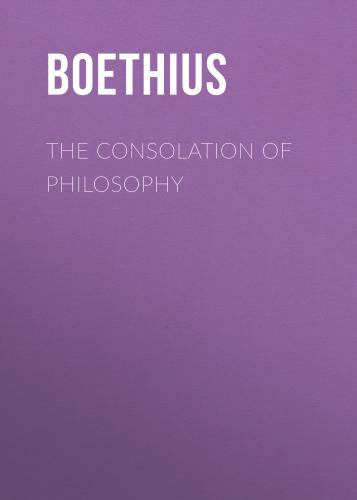The Consolation of Philosophy. Boethius
is to preserve his life, how happy art thou, couldst thou but recognise thy blessings, who possessest even now what no one doubts to be dearer than life! Wherefore, now dry thy tears. Fortune's hate hath not involved all thy dear ones; the stress of the storm that has assailed thee is not beyond measure intolerable, since there are anchors still holding firm which suffer thee not to lack either consolation in the present or hope for the future.'
'I pray that they still may hold. For while they still remain, however things may go, I shall ride out the storm. Yet thou seest how much is shorn of the splendour of my fortunes.'
'We are gaining a little ground,' said she, 'if there is something in thy lot wherewith thou art not yet altogether discontented. But I cannot stomach thy daintiness when thou complainest with such violence of grief and anxiety because thy happiness falls short of completeness. Why, who enjoys such settled felicity as not to have some quarrel with the circumstances of his lot? A troublous matter are the conditions of human bliss; either they are never realized in full, or never stay permanently. One has abundant riches, but is shamed by his ignoble birth. Another is conspicuous for his nobility, but through the embarrassments of poverty would prefer to be obscure. A third, richly endowed with both, laments the loneliness of an unwedded life. Another, though happily married, is doomed to childlessness, and nurses his wealth for a stranger to inherit. Yet another, blest with children, mournfully bewails the misdeeds of son or daughter. Wherefore, it is not easy for anyone to be at perfect peace with the circumstances of his lot. There lurks in each several portion something which they who experience it not know nothing of, but which makes the sufferer wince. Besides, the more favoured a man is by Fortune, the more fastidiously sensitive is he; and, unless all things answer to his whim, he is overwhelmed by the most trifling misfortunes, because utterly unschooled in adversity. So petty are the trifles which rob the most fortunate of perfect happiness! How many are there, dost thou imagine, who would think themselves nigh heaven, if but a small portion from the wreck of thy fortune should fall to them? This very place which thou callest exile is to them that dwell therein their native land. So true is it that nothing is wretched, but thinking makes it so, and conversely every lot is happy if borne with equanimity. Who is so blest by Fortune as not to wish to change his state, if once he gives rein to a rebellious spirit? With how many bitternesses is the sweetness of human felicity blent! And even if that sweetness seem to him to bring delight in the enjoying, yet he cannot keep it from departing when it will. How manifestly wretched, then, is the bliss of earthly fortune, which lasts not for ever with those whose temper is equable, and can give no perfect satisfaction to the anxious-minded!
'Why, then, ye children of mortality, seek ye from without that happiness whose seat is only within us? Error and ignorance bewilder you. I will show thee, in brief, the hinge on which perfect happiness turns. Is there anything more precious to thee than thyself? Nothing, thou wilt say. If, then, thou art master of thyself, thou wilt possess that which thou wilt never be willing to lose, and which Fortune cannot take from thee. And that thou mayst see that happiness cannot possibly consist in these things which are the sport of chance, reflect that, if happiness is the highest good of a creature living in accordance with reason, and if a thing which can in any wise be reft away is not the highest good, since that which cannot be taken away is better than it, it is plain that Fortune cannot aspire to bestow happiness by reason of its instability. And, besides, a man borne along by this transitory felicity must either know or not know its unstability. If he knows not, how poor is a happiness which depends on the blindness of ignorance! If he knows it, he needs must fear to lose a happiness whose loss he believes to be possible. Wherefore, a never-ceasing fear suffers him not to be happy. Or does he count the possibility of this loss a trifling matter? Insignificant, then, must be the good whose loss can be borne so equably. And, further, I know thee to be one settled in the belief that the souls of men certainly die not with them, and convinced thereof by numerous proofs; it is clear also that the felicity which Fortune bestows is brought to an end with the death of the body: therefore, it cannot be doubted but that, if happiness is conferred in this way, the whole human race sinks into misery when death brings the close of all. But if we know that many have sought the joy of happiness not through death only, but also through pain and suffering, how can life make men happy by its presence when it makes them not wretched by its loss?'
SONG IV.
The Golden Mean
Who founded firm and sure
Would ever live secure,
In spite of storm and blast
Immovable and fast;
Whoso would fain deride
The ocean's threatening tide;—
His dwelling should not seek
On sands or mountain-peak.
Upon the mountain's height
The storm-winds wreak their spite:
Конец ознакомительного фрагмента.
Текст предоставлен ООО «ЛитРес».
Прочитайте эту книгу целиком, купив полную легальную версию на ЛитРес.
Безопасно оплатить книгу можно банковской картой Visa, MasterCard, Maestro, со счета мобильного телефона, с платежного терминала, в салоне МТС или Связной, через PayPal, WebMoney, Яндекс.Деньги, QIWI Кошелек, бонусными картами или другим удобным Вам способом.
